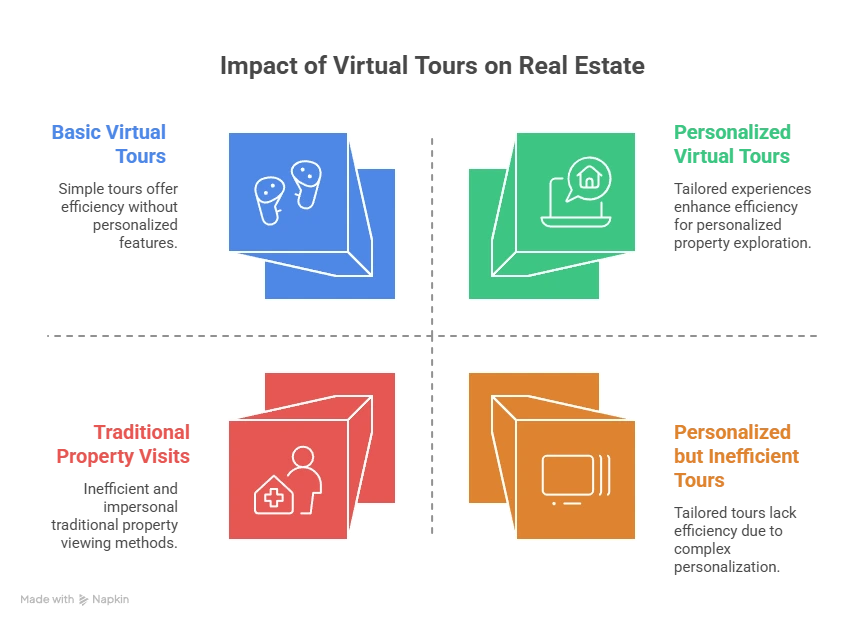In recent years, the real estate sector has undergone a transformative shift driven by technology. One of the most exciting innovations in this space is Generative AI, which has opened up new avenues for virtual tours and smart listings. This blog will explore how Generative AI is reshaping the landscape of real estate, particularly by enhancing the buyer experience and streamlining property listings. We will dive into its role in creating immersive virtual tours, generating dynamic property descriptions, and the profound impact it is having on both buyers and sellers.

What Is Generative AI, and How Is It Being Used in Real Estate?
Generative AI, at its core, is a technology that utilizes machine learning to create new content, models, or solutions based on input data. In the real estate industry, this technology can be harnessed to automate and optimize tasks that traditionally required significant human effort, such as creating property listings, generating virtual tours, and even personalizing user experiences.
For instance, AI algorithms can create hyper-realistic virtual representations of properties, offering potential buyers or renters a 360-degree view of the property without the need for physical presence. These AI-generated tours can simulate the experience of walking through a home, providing an immersive, interactive experience. In addition, AI can analyze a buyer’s preferences and suggest homes or commercial properties that match their criteria, revolutionizing the way listings are presented.

How Are Virtual Tours Changing the Real Estate Buying Experience?
Virtual tours are perhaps the most compelling use case of Generative AI in real estate. Traditionally, buying a home or commercial space involved attending multiple physical viewings, which is both time-consuming and expensive. However, AI-generated virtual tours offer a compelling alternative that allows buyers to explore properties at their own pace, from anywhere in the world.

1. Enhanced Visualization
Generative AI can produce realistic 3D renderings and interactive floor plans. Through AI-powered platforms, homebuyers can navigate properties just like they would in person, from the living room to the kitchen, experiencing the home’s ambiance, lighting, and layout in stunning detail.
2. Cost Efficiency and Time Savings
By using virtual tours, buyers and sellers can save significant amounts of time and money. Virtual tours eliminate the need for multiple property visits and unnecessary travel, which is especially beneficial for buyers who may be looking in different cities or even countries. Moreover, for sellers, it reduces the cost of staging homes or scheduling numerous viewings.
3. Personalized Property Experience
Generative AI enables personalized virtual tour experiences based on user preferences. For instance, if a user is particularly interested in a large kitchen or open-plan living space, AI can highlight these features during the virtual tour. Additionally, some AI systems can suggest improvements or design alterations to help buyers visualize their ideal space.
What Are Smart Listings, and How Do They Benefit Buyers and Sellers?
Smart listings are another area where Generative AI has significantly impacted the real estate market. These listings leverage AI to automate property descriptions, enhance keyword optimization, and even adjust pricing based on real-time market data. Let’s break down how smart listings are changing the game:
1. AI-Generated Descriptions
Generative AI can write property descriptions by analyzing key features such as square footage, the number of rooms, and unique selling points. This helps agents save time and ensure consistency across listings. These descriptions are not only informative but are also optimized for search engines, increasing the property’s visibility online.
2. Dynamic Pricing
AI algorithms can assess market trends, demand, and property conditions to automatically adjust prices. This ensures that a property’s price is always competitive with others in the same market. Sellers can benefit from having their properties listed at optimal prices, ensuring they don’t overprice or underprice.
3. Enhanced Searchability
AI ensures that listings are optimized for search engines, which means they appear higher in search rankings. Through the use of keywords and LSI (Latent Semantic Indexing) keywords, AI can improve the likelihood of a property being found by potential buyers.
4. Automated Market Trend Insights
AI algorithms can analyze vast amounts of data to identify trends and forecasts about the real estate market. This enables both buyers and sellers to make better, more informed decisions regarding when to buy, sell, or rent.

Are There Any Statistics to Support the Effectiveness of AI in Real Estate?

AI is making a significant impact on the real estate industry, with numerous studies and statistics showcasing its effectiveness. For example, a recent report found that 70% of buyers use virtual tours to narrow down their property choices before making an in-person visit, demonstrating the growing importance of AI-powered virtual tours in the decision-making process. Furthermore, AI-powered listing platforms have seen up to a 30% increase in property visibility and a 20% reduction in time spent on the market due to smart pricing and automated descriptions.
The Future of AI in Real Estate
Looking ahead, the role of AI in real estate will continue to grow and evolve. We may soon see even more advanced capabilities, such as AI-generated video tours, where potential buyers can interact with 3D avatars guiding them through properties. Additionally, AI will continue to refine the personalization of property recommendations, taking into account a user’s preferences for things like layout, neighborhood, and even future resale value.
FAQs About Generative AI in Real Estate
1. How does Generative AI improve virtual tours in real estate?
Generative AI enhances virtual tours by creating realistic, interactive 3D renderings of properties that buyers can explore at their own pace, offering a fully immersive experience.
2. Are AI-generated property descriptions better than traditional ones?
Yes, AI-generated descriptions are optimized for search engines and are consistent, helping increase the visibility of properties and ensuring they stand out in a crowded market.
3. How does AI help in pricing real estate?
AI uses data-driven insights to adjust pricing dynamically, ensuring properties are listed at competitive rates based on current market trends and demand.
4. Can AI help real estate agents with their workload?
Yes, AI automates repetitive tasks like property descriptions and virtual tours, allowing agents to focus on client relationships and closing deals.
5. How will AI shape the future of real estate?
AI will continue to enhance the buying and selling process with more advanced virtual tours, personalized property recommendations, and better predictive pricing, making real estate transactions faster and more efficient.
Resource Center
These aren’t just blogs – they’re bite-sized strategies for navigating a fast-moving business world. So pour yourself a cup, settle in, and discover insights that could shape your next big move.
How the New AI-Assisted Skills Feature Empowers Developers to Architect Smarter Systems?
In today’s rapidly evolving digital landscape, developers face intense pressure to build complex applications faster while maintaining high standards of reliability, performance, and scalability. Traditional development methodologies are being [...]
AI-Assisted Development vs Vibe Coding: What Truly Scales in Production?
The rise of generative AI tools has transformed modern software development. From auto-completing functions to generating entire modules, AI-powered coding assistants have become part of daily workflows. Yet, not [...]
What OpenClaw Doesn’t Tell You: The Security Risks of AI with Full System Access
Over the last few months, autonomous AI agents have moved from experimental prototypes to mainstream productivity tools. Among them, OpenClaw has emerged as one of the most talked-about open-source [...]

